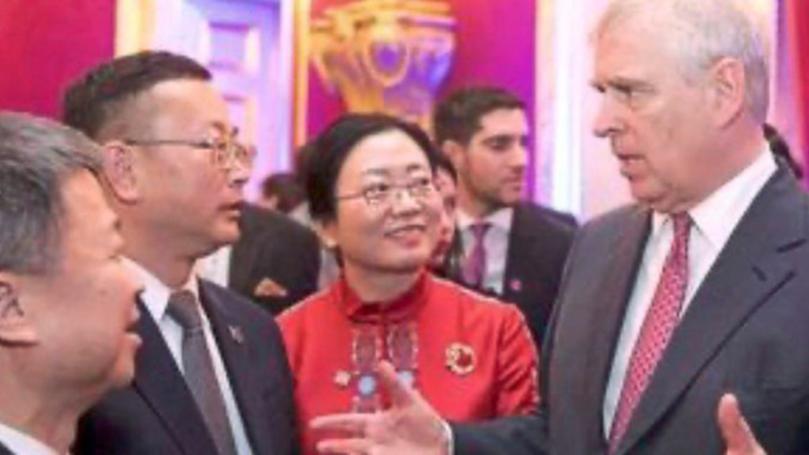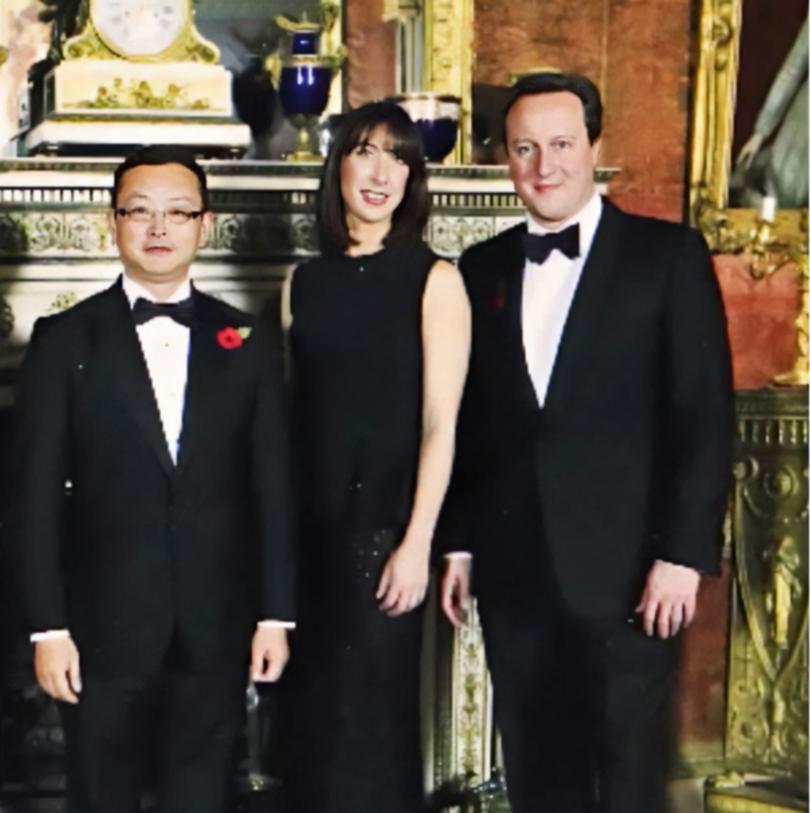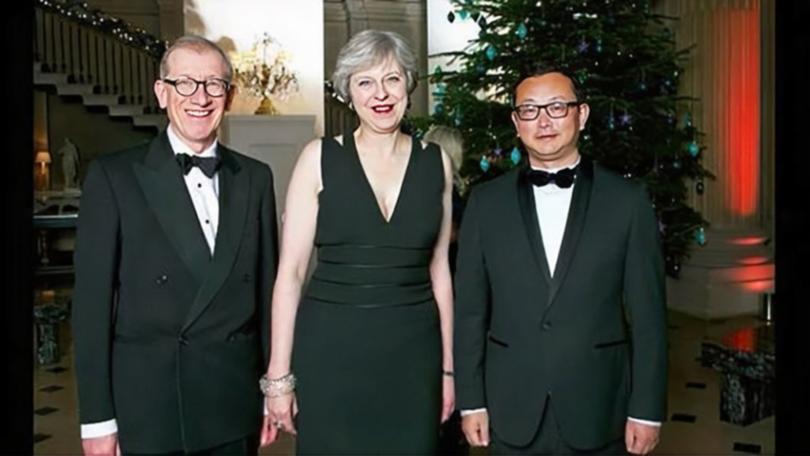Prince Andrew’s China spy pal Yang Tengbo wormed his way to top of British society
The man identified as a Beijing spy exerting his influence over Prince Andrew has long operated in plain sight as an Anglophile Chinese businessman keen to forge meaningful links between the two nations.

If the mission for Yang Tengbo, the Chinese national accused of being the spy who cosied up to troubled royal Prince Andrew, mission was to penetrate the heart of the British establishment, then it must be said that he did an exceptional job.
Operating in plain sight as an Anglophile Chinese businessman keen to forge meaningful links between the two nations, he infiltrated top institutions with astonishing success.
Now that an order forbidding naming the alleged spy formerly known as H6 has been lifted at his own request, Yang’s incredible web of influence across British society can be disclosed for the first time.
Sign up to The Nightly's newsletters.
Get the first look at the digital newspaper, curated daily stories and breaking headlines delivered to your inbox.
By continuing you agree to our Terms and Privacy Policy.A shadow gliding through the corridors of power, the diminutive businessman spent two decades quietly embedding himself into the fabric of UK politics, business, education, industry and royalty.
So close was the 50-year-old to the Duke of York that he referred to himself in interviews with Chinese media as the “special envoy of Prince Andrew”.
The duke invited him to his 60th birthday party in 2020 and appointed him head of the Chinese arm of his beloved Dragons’ Denstyle project, Pitch@Palace, which used Buckingham Palace as the official address for the Hong Kong branch. Yang was also photographed with Prince Michael of Kent at a UK China Business Leader Summit in June 2016 at Windsor Castle.
But it wasn’t just members of the Royal Family who were successfully cultivated by the bespectacled businessman. Framed photos of Yang with former prime ministers Theresa May and David Cameron adorned the desk in his London office.
And he rubbed shoulders with then-chancellor George Osborne at the first UK-China Business Leaders’ Summit in 2014, arranged by Yang himself.
This ability to charm top politicians and royals extended to those involved in Britain’s most prestigious educational establishments.
Yang played a pivotal role in establishing campuses in China for the elite Gordonstoun boarding school attended by King Charles. The £61,440 ($122,000)-a-year establishment, also attended by Prince Andrew and Prince Philip, was the birthplace of the Duke of Edinburgh Award and the Round Square conference of schools, established “to create opportunities for students and teachers to develop international understanding and self-confidence”.
Yang’s consultancy company, the Hampton Group, has been overseeing the expansion of Gordonstoun into China that was made public in 2019, much to the consternation of some of its illustrious alumni.
Among them was film director and author Justin Baldwin, who captained Gordonstoun’s hockey team before directing Cash In Hand, starring Richard E Grant. When the move was announced, he said: “Why would we put a school in a country where they have camps to convert Muslims by feeding them pork? That’s everything that (Gordonstoun founderP) Kurt Hahn was against.”
In addition to schooling, Yang has been heavily involved with the business elite, including in particular the late Lady (Barbara) Judge, described by Radio Four’s Woman’s Hour as “one of the best-connected women in Britain”. Yang invested with Lady Judge, a former chairman of both the UK Atomic Energy Authority and the Institute of Directors, in a fashion and soft furnishings company.

It was with an uncanny sense of timing that he rode to the rescue during a rare moment of vulnerability in her life. With his financial support – and in return for a 40 per cent share of her start-up company – she was able to launch B&H Enterprise after quitting the Institute of Directors amid allegations of bullying, racism and sexism in 2018.
The other company directors were Chinese entrepreneur Hua Xia, who appeared with Yang at Pitch@Palace Beijing in 2019, and Hampton Group chief executive Jean Jameson, who was also the UK secretary general for the Chinese arm of Pitch@Palace.
Lady Judge CBE, a high-flying lawyer, banker and entrepreneur who championed women’s rights in the workplace, had been accused of more than 40 episodes of unreasonable behaviour while chairman of the institute. She was also a former chairman of the UK’s fraud prevention service Cifas, of the Pension Protection Fund, an ambassador on behalf of UK Trade & Investment, and trustee of several cultural and charitable institutions, including the Royal Academy of Arts and Dementia UK.
Ably straddling so many influential roles across some of Britain’s most important institutions, and unhindered by royal protocols, Lady Judge would have had the power and access that Prince Andrew could only dream of. It is not known how she first crossed paths with Yang, who is also co-owner of fund management firm Coeus International with ex-McLaren chief executive Sir Ron Dennis, a former nonexecutive director at the Department for Science, Innovation and Technology.
Yang founded Hampton Group in 2005 and opened offices in the City of London. On its website, the firm, which also has an office in Beijing, states that it “delivers strategic advisory, investment solutions and communications services to help leaders of international and Chinese companies solve business-critical challenges and seize unique opportunities”.
Yang has himself described how the company worked with some of Britain’s biggest international companies, including helping McLaren Automotive to introduce a luxury road car. He claimed the firm, which recorded a healthy profit of £5.65 million in its latest accounts, helped guide Glaxo SmithKline through a whistleblowing investigation.
Yang was born in Yunnan, southern China, in 1974, and graduated from the local university with a history degree before working for seven years at a “national government agency”.
He moved to the UK in 2002 where, on his second attempt, he gained the minimum score in an English test to study for a degree, eventually winning a place on a master’s course in public administration at York University.
In a 2006 BBC profile on Chinese students in Britain, Yang was said to have “forced himself to change his past thinking mode in Chinese and think and express in English, which would achieve twice the result with half the effort”.
And it appeared Yang quickly became enamoured with the British way of life. He gained indefinite leave to remain in 2012 and, according to court documents, would spend one or two weeks in the UK every month, considering it to be his “second home”.
He spent two decades carefully integrating himself into Britain’s power structure before he was stopped from entering the country under counter-terrorism laws in November 2021.
Advisers close to the Duke of York continued to do business with Yang, however. In November 2022, Andrew’s “senior adviser”, Dominic Hampshire, was one of five directors who set up the firm Eurasia Global Partners, reportedly to look at the prospect of importing oil into China.

Another director was Irish oil tycoon Aidan Heavey. The firm partnered with Yang’s Hampton Group, and together they owned 30 per cent of the business, with Mr Heavey’s Albe Global owning 60 per cent and Mr Hampshire’s own consultancy owning 10 per cent.
Eurasia was also the name of the international finance initiative which Mr Hampshire said Yang could discuss with potential partners in China on behalf of the duke.
Mr Hampshire was integral to the duke’s relationship with the Chinese businessman. Court documents show that in March 2020, he told Yang: “I also hope that it is clear to you where you sit with my principal (Andrew) and indeed his family.
“You should never underestimate the strength of that relationship. Outside of his closest internal confidants, you sit at the very top of a tree that many, many people would like to be on.”
When in 2018 Prince Andrew extolled the virtues of China’s controversial Belt and Road Initiative to increase its global influence by helping build infrastructure projects in developing countries, one wonders whether it was Yang who had encouraged him to do so.
The scheme has been criticised because the regime can seize assets or exert influence in these countries in the event of a debt default. In an interview with China Daily in 2022, Yang said he was encouraging the UK to get involved in the program.
“We will link China’s kinetic energy to Britain’s potential energy, give full play to the advantages of both sides, and jointly explore potential commercial value in third-party countries’ markets,” he said.
In another interview, Yang said that following Brexit, the UK was “looking eastward, hoping to … strengthen co-operation with China”.
A possible interpretation of this quote is that it could be a crystallisation of Yang’s own modus operandi. His targets, Lady Judge and Prince Andrew included, were often once mighty figures suddenly beginning to feel weakened and isolated when he arrived with a lifeline.
Does China see Britain in the same way? If the allegations that Yang has indeed spied for the state prove to be true, then his brazen march through our corridors of power would certainly suggest so.
